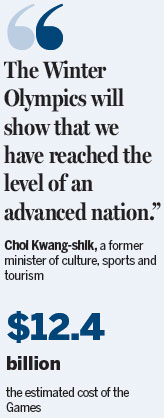Supporters say the 2018 Games will boost South Korea's image
When Pyeongchang was awarded the 2018 Olympics six years ago, many South Koreans felt that the first Winter Games on home snow would herald their entry into the top tier of rich nations.
One year before the Olympics, however, the country is in political disarray, and winter sports are the last thing on many people's minds. To say that South Koreans are distracted from what had been billed as a crowning sports achievement is an understatement.
After protests that saw millions take to the streets, South Korea's president, toppled from power, languishes in her mountainside palace as a court ponders whether to approve her impeachment and trigger early elections. A toothless prime minister, thrust into leadership by the country's biggest corruption scandal in recent memory, struggles with huge economic, social and diplomatic tensions.
Spending for the Pyeongchang Games will likely be about 14.2 trillion won ($12.4 billion), with 11.4 trillion of that for building competition venues, roads and a new high-speed rail line designed to link the country's main gateway of Incheon International Airport with Pyeongchang in about 90 minutes. About 6,500 athletes, coaches and sports officials from about 95 countries are expected to attend the Pyeongchang Games. Foreigners will also be streaming in to watch, but organizers hope that 70 percent of ticket sales will be local. That means creating buzz at home is crucial.
Despite the political turmoil, the Pyeongchang Olympics will likely be well-organized and ready-to-go, especially when compared with the recent games in Rio de Janeiro and Sochi, Russia, which saw swirling human rights, environmental and political crises.

Still, the upheaval in government will likely dominate headlines throughout the year.
Even with the political mess, there are still high hopes for the second Olympics to be held in South Korea, whose capital, Seoul, hosted the 1988 Summer Games.
South Korea used the Seoul Olympics to highlight its economic rise from the rubble of the Korean War (1950-53). The country has since staged two Asian Games, co-hosted the soccer World Cup in 2002 with Japan and held other high-profile international events, including the 2010 Group of 20 economic summit.
"The Winter Olympics will show that we have reached the level of an advanced nation," said Choi Kwang-shik, a former minister of culture, sports and tourism who teaches at Korea University.
Pyeongchang supporters say the 2018 Games will boost South Korea's image because only advanced, rich countries usually host Winter Olympics.
Critics, however, question the need to host costly international events and waste taxpayers' money when many South Koreans are struggling economically.
The Pyeongchang Olympics, like much else in South Korea, have been drawn into the country's biggest political scandal in decades.
Prosecutors say President Park Geun-hye and her longtime friend Choi Soon-sil plotted to pressure businesses to donate tens of millions of dollars to two nonprofit foundations controlled by Choi, one of them sports-related.
